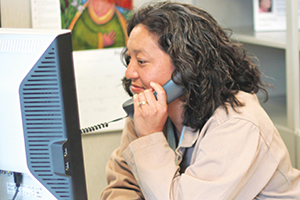Leslie Duke, a retired Ford auto worker and full-time putterer, fell in his basement while working on his antique tool collection. He couldn't remember what happened.
He suffered brain damage and spent six weeks in a hospital in Nashville, Tenn. When he went home, friends greeted him with warm wishes and gifts. They returned for more visits. Then the visits dropped off.

Rev. Cathy Chang arranges to meet a patient wherever he or she is most comfortable — at home, a coffee shop, park or a place of worship.
Image credit: Jocelyn Harms, MissionPoint Health Partners
"After a while, people stop coming. They forget," said his wife, Odessa Duke.
Enter the Rev. Catherine Chang, chaplain for MissionPoint Health Partners, an accountable care organization. MissionPoint advocates for patients, some of whom have chronic illnesses, after they are discharged from traditional hospitals. Its nurses and counselors make home visits, help patients navigate the health care system and arrange things from doctors' appointments to footstools for people who have trouble getting into bed.
Consistent with that mission, Chang also makes house calls. She visited Leslie Duke regularly until he died in March at age 84. Chang said she wants to help patients work through the emotional and spiritual effects of long-term medical issues, consistent with their religious convictions.
The gift of conversation
Odessa Duke said simply that Chang was good company and comfort to her husband.
"He was always glad to see Cathy," she said. "My husband was a very religious man. They would talk about God and love and God's mysterious ways. They would talk about anything. He loved to collect things from estate sales. He loved antique cars. They'd talk about all that stuff.
"Cathy is a great listener and builder-upper," she said. "Her visits always gave my husband encouragement."
Chang, an ordained Unitarian Universalist minister, worked as a traditional hospital chaplain for five years at Saint Thomas Health in Nashville. In 2011, Saint Thomas founded MissionPoint to work with health networks in providing customized care and follow-ups for patients and reduce hospital readmissions. Ascension, which operates Saint Thomas, made MissionPoint a direct subsidiary and expanded it into six more states, serving more than 250,000 people.
Chang said the Saint Thomas chaplaincy "loaned" her to MissionPoint when it was started. After a while, she became its first full-time chaplain for the greater Nashville area. She describes her job as a hybrid of hospital chaplain and minister at a regular community congregation.
"When I was a hospital chaplain, I often didn't know what happened to patients after they went home," Chang said. "Now, I get to meet them on their ground. I follow them and learn how they live their lives, how they transition and grow into accepting what has happened. I can help them come to peace with things."
Chang said she visits patients at their homes or meets them at neutral sites, such as coffee shops. She also keeps in touch with regular phone calls.
For Leslie Duke, who couldn't leave home, she dropped by for their relaxed and rambling chats, sometimes talking with him in his bedroom or other times in the family den, where he had a motorized lift chair that helped him get up. All around were the estate-sale knickknacks he enjoyed telling her about.
'Spiritual way station'
The time invested is a special privilege for Chang, who knows that few matters of serious illness or religion are resolved in five-minute bedside visits in hospital rooms. Matters as important as religious belief and acceptance of mortality are continuing conversations. She gets to have them.
Chang said many of the issues she deals with aren't strictly medical, but more a matter of how an individual's experiences with health care and their medical conditions have changed their lives.
"What I often try to help with is a sense of isolation," Chang said. "They have had a major medical event. They can't drive anymore. They can't work. It's often hard for them even to get to church or the grocery store. They lose their sense of community, and it changes how they define themselves."
One of MissionPoint's goals is to secure medical homes for its patients. Chang wants to find them permanent spiritual homes, or get them back to the churches they attended before their illness. In that sense, she calls herself a "spiritual way station." And as she learns about medical needs, she passes along information to MissionPoint nurses and counselors, who also make house calls.
A good death
If patients go into hospice, she usually defers to the chaplains in those programs. But in between hospital and hospice, she gets to be their minister.
She remembers one man who eventually told her that what he most missed was seeing his grandchildren's ball games. Chang helped to arrange trips to the field. In another case, she stayed in touch with a young woman whose husband had been critically injured in an accident, and who later died of his injuries. With that trust earned, Chang was able to comfort her after his death and encourage her to resume seeing her friends.
With the time she invests in her patients, Chang is able to discuss such things as advanced-care directives. "Part of my job is to learn their views of quality of life and what would make a good death," she said. "It's a transitional process that people can grow into and gradually accept what is happening, to explore their mortality."
Odessa Duke can't remember details of Chang's theological discussions with her husband, who had been a longtime member of the Church of Christ, a considerably more traditional denomination than Unitarianism.
"All I know is that he was always very happy to talk to Cathy," she said.
Copyright © 2015 by the Catholic Health Association
of the United States
For reprint permission, contact Betty Crosby or call (314) 253-3477.